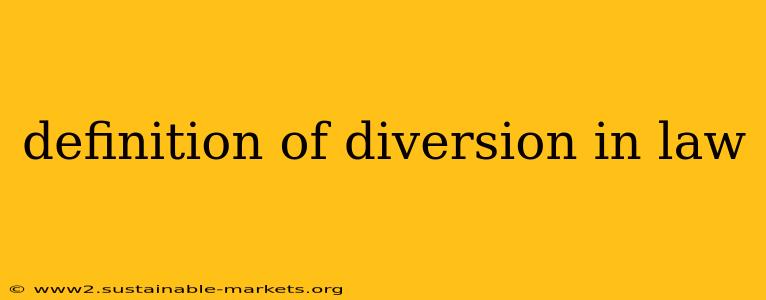Diversion in law refers to a process where an individual charged with a crime, typically a less serious offense, is offered an alternative to traditional prosecution. Instead of facing trial and potential incarceration, the individual participates in a program designed to address the underlying causes of their behavior and rehabilitate them. This avoids the stigma and consequences of a criminal record, while still holding the individual accountable for their actions. The specific details of diversion programs vary widely depending on jurisdiction, the nature of the offense, and the individual's circumstances.
Types of Diversion Programs
Diversion programs take many forms, catering to various offenses and offender profiles. Some common examples include:
1. Drug Courts:
These specialized courts focus on individuals charged with drug-related offenses. Participants must adhere to strict conditions, including regular drug testing, counseling, and participation in treatment programs. Successful completion typically leads to dismissal of charges.
2. Mental Health Courts:
Similar to drug courts, mental health courts target individuals with mental health issues who have committed crimes. The focus is on treatment and rehabilitation, aiming to address the root causes of their criminal behavior.
3. Veterans Courts:
These courts are designed for veterans facing criminal charges, often stemming from issues related to PTSD or other service-connected disabilities. The program emphasizes treatment and support tailored to the unique needs of veterans.
4. Pre-Trial Diversion:
This involves diverting individuals before trial. The individual agrees to specific conditions, such as completing community service, attending counseling, or abstaining from alcohol or drugs. If they successfully complete the program, the charges may be dismissed.
5. Deferred Adjudication:
This differs from pre-trial diversion in that the defendant pleads guilty or no contest, but the judge defers adjudication (formal judgment) of guilt. Successful completion of the diversion program leads to the charges being dismissed; failure can result in a conviction.
Eligibility Criteria
Eligibility for diversion programs varies significantly depending on the jurisdiction and the specific program. Factors often considered include:
- Nature of the offense: Diversion is generally reserved for less serious offenses, such as misdemeanor charges. Felonies are less frequently eligible.
- Criminal history: Individuals with extensive criminal records are often ineligible.
- Willingness to participate: Participation in diversion programs is voluntary; individuals must actively agree to the conditions.
- Assessment of risk and needs: Assessments are often conducted to determine if the individual is suitable for diversion and to tailor the program to their specific needs.
Benefits of Diversion
Diversion offers several benefits for both the individual and the justice system:
For the Individual:
- Avoids a criminal record: This is a significant benefit, preventing potential barriers to employment, housing, and other opportunities.
- Access to treatment and support: Diversion provides access to crucial services that address underlying issues contributing to criminal behavior.
- Reduced stigma: Diversion avoids the negative social consequences associated with a criminal conviction.
For the Justice System:
- Reduces caseloads: Diversion programs can alleviate the burden on already crowded courts.
- Cost-effective: Diversion is often more cost-effective than traditional prosecution, particularly in the long term.
- Improved public safety: Addressing underlying issues can lead to a reduction in recidivism, improving public safety.
Conclusion
Diversion programs represent a significant shift in the approach to criminal justice, moving away from purely punitive measures towards a more rehabilitative model. While not suitable for all offenders or all crimes, diversion programs offer a valuable opportunity for individuals to address their issues, avoid the devastating effects of a criminal record, and ultimately become productive members of society. Understanding the nuances of diversion is crucial for both legal professionals and the public alike.

